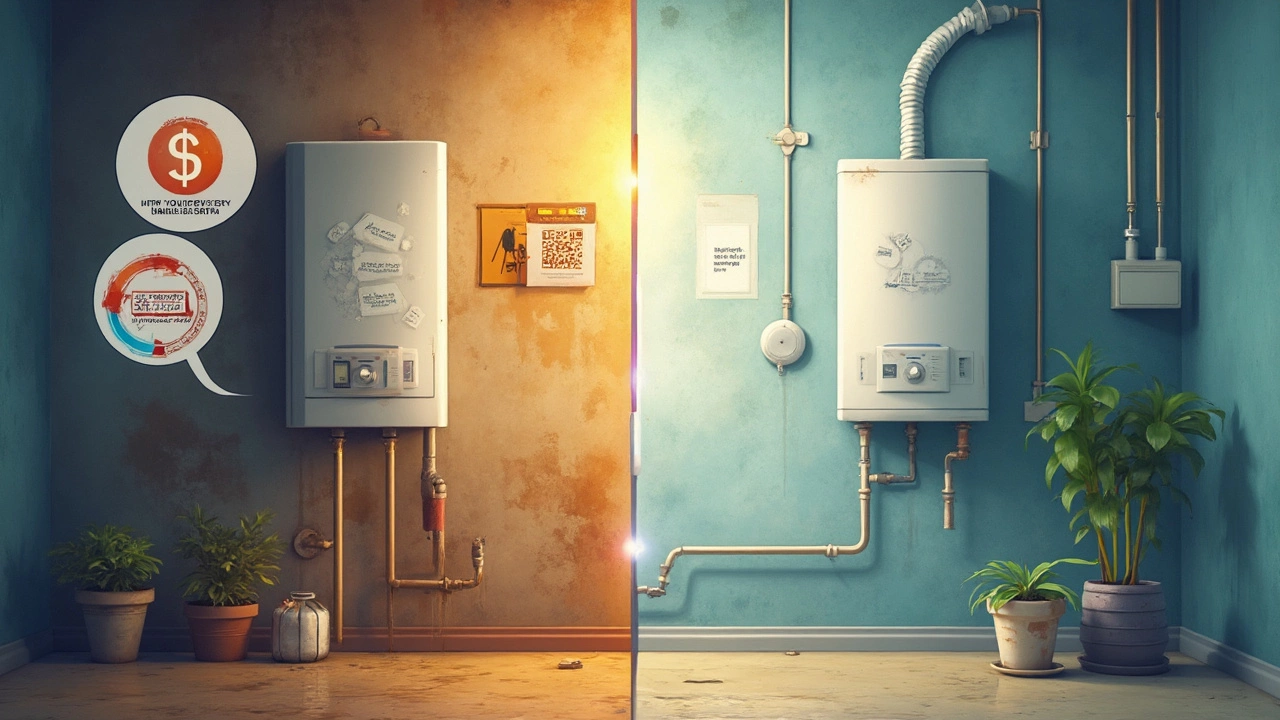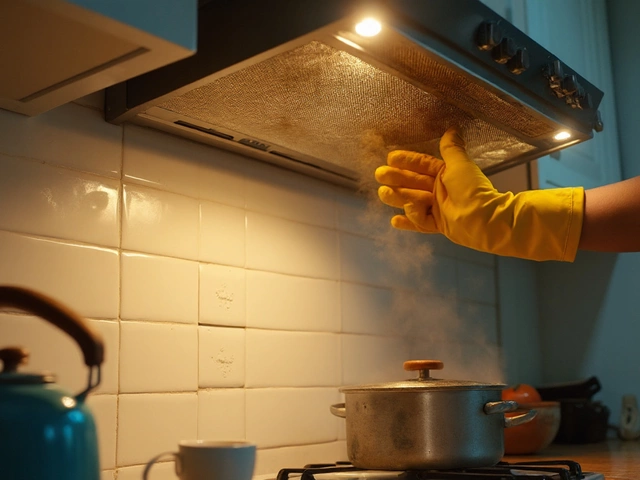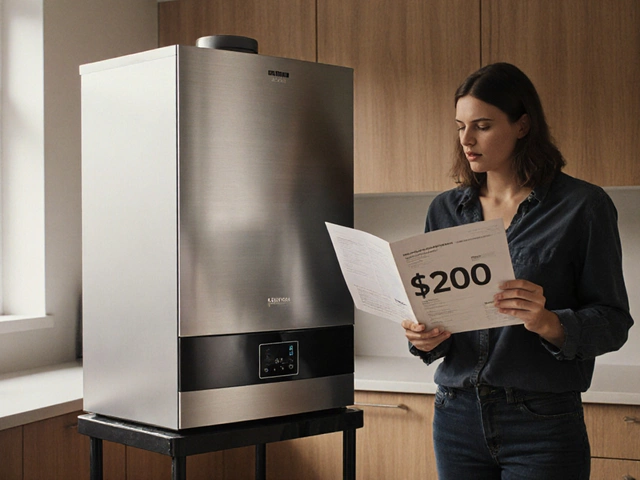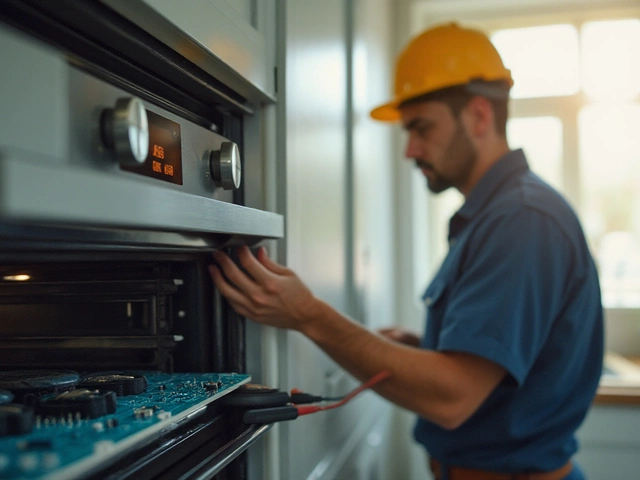Sticker shock. That's how boiler replacement hits most people. You think the old one can hang in for another winter, but after your third call to the repair guy in two months, it feels like pouring cash down the drain. But how much are we actually talking if you need a new one?
In the UK for example, a straightforward swap for a standard combi boiler can cost anywhere from £1,500 to £3,000. In the US, swapping a gas boiler out usually runs between $3,500 and $8,000—sometimes more if you need extra work like upgrading pipes or rewiring thermostats. The wild part? These numbers change based on brand, size, how tricky the install is, and which heating engineer you trust.
So, it's not just the boiler itself. You've got labor, maybe new controls, upgraded vents, a flush of your heating system, and disposal of the old one. Most people get caught off guard by the add-ons, not the sticker on the shiny new unit.
- The Real Cost of Replacing a Boiler
- What Drives Up the Price?
- How to Tell Your Boiler Needs Replacing
- Ways to Save on Boiler Replacement
- Hidden Costs and Smart Decisions
The Real Cost of Replacing a Boiler
When it comes to boiler replacement, the price tag isn't just about the unit itself. The base cost for a new boiler can range from $3,500 for a basic model in a small home, all the way to $10,000 or more if you need a high-efficiency option or have a bigger place. In the UK, as of 2024, you’re looking at around £1,800 to £3,500 for a standard swap, and up to £5,000 or more if things get complicated—combi boilers usually sit at the cheaper end, system boilers and conventional ones push costs higher because of the extra parts.
Breaking it down, you pay for:
- The boiler itself
- Labour charged by the heating engineer
- Any new pipework, controls, or thermostats
- System flushing or power flush (to clean radiators and pipes)
- Disposal of your old boiler
Here’s a quick look at typical prices for a full boiler replacement:
| Type of Boiler | US Install Cost | UK Install Cost |
|---|---|---|
| Combi Boiler | $4,000 - $7,000 | £1,800 - £3,000 |
| System Boiler | $5,000 - $8,500 | £2,000 - £4,000 |
| Conventional/Regular Boiler | $5,500 - $10,000 | £2,500 - £5,000 |
Labour is a big chunk. In most cases, it’ll run you $2,000 to $4,000 (or about £800 to £2,000 in the UK), but that climbs fast if the job needs more than a straight swap—think moving the boiler, upgrading pipes, or rerouting vents. Remember, brands matter: familiar names like Worcester Bosch, Vaillant, or Navien can cost more but may give you longer warranty and better efficiency.
If your heating is ancient or was “DIY’d” by a previous owner, expect surprises once your installer opens things up. You could need extra repairs, which adds both time and money. Nobody likes hidden costs but, if you budget on the higher end, you’re less likely to get caught short.
What Drives Up the Price?
A lot of folks think replacing a boiler is just picking a model and getting it slotted in. Nope—several things play into why prices swing so widely. Let’s break it down so you actually know what you’re paying for.
The biggest chunk, of course, is the boiler replacement unit itself. Cheaper, no-frills combis will cost less, but if you go for a top brand with all the smart features, the price jumps fast. Efficiency matters too. An A-rated gas boiler might cost more up front, but you’ll save on bills in the long run.
Installation—the hidden beast. If your new boiler can slide into where the old one sat, labor can be a breeze. But, move it to a new spot? Extra pipework, more hours, more money. Need a system flush (recommended if your radiators are grimy inside)? That adds to the tab too. Some installers even charge by the hour depending on how fiddly the job is.
Not all homes are boiler-ready. If the wiring, gas lines, or flue aren’t up to modern rules, you’ll have to shell out to get those sorted. Throw-in a new thermostat, smart controls, or a filter, and the bill can jump again.
If you love a good visual, here’s a quick look at the kind of cost breakdown you might see when it comes to a boiler swap:
| Item | Typical Cost Range (USD) |
|---|---|
| Boiler unit | $1,500 to $4,000 |
| Labor | $1,000 to $3,000 |
| System flush | $300 to $800 |
| Upgraded piping/wiring | $500 to $2,000 |
| Junk removal (old boiler) | $100 to $500 |
Location plays a part, too. If you’re in London, expect to pay more than if you live in a quiet northern town, just because everything from parts to labor costs more in big cities.
Last tip—don’t get caught up chasing the lowest up-front price. Sometimes, paying a bit more for better materials or a solid installer saves headaches (and cash) later on. Ask for all the costs (including hidden fees for disposal or upgrades) before you sign anything. That way, your boiler replacement cost won’t spiral out of control.

How to Tell Your Boiler Needs Replacing
It’s tempting to keep fixing an old boiler and hope for the best, but sometimes it’s just not worth it anymore. So how do you know when it’s time for a boiler replacement instead of another repair?
Here are some warning signs your boiler is about to give up the ghost:
- Endless Repairs: If you’re calling out a heating engineer two or three times a year, that money adds up fast. Most boilers only need an annual service.
- Age Over 15 Years: Old boilers from before 2010 just can’t compete on efficiency. Parts get harder to find and breakdowns come quicker. If yours is pushing 15–20 years, you’re on borrowed time.
- Strange Noises: Banging, whistling, or gurgling sounds aren’t normal. They usually mean mineral build-up, broken parts, or water pressure problems that can wreck your boiler for good.
- Yellow Flame or Soot: The burner flame should be blue, not yellow. Yellow means possible carbon monoxide—serious stuff that can be dangerous for your family.
- Rising Heating Bills: If your bills keep going up but you’re not using more heat, your boiler’s probably running at low efficiency. Newer models are up to 94% efficient; old ones might drop below 60%.
- Leaks: Any water pooling or dripping from the boiler itself usually means a crack or corrosion. Both are almost never worth fixing on an old system.
Here’s a quick breakdown comparing repair costs versus replacement for typical boilers (based on UK and US averages):
| Boiler Age | Avg Annual Repair Cost | Replacement Cost |
|---|---|---|
| 5 years | £90 / $110 | £1,800 / $4,500 |
| 10 years | £250 / $300 | £1,800 / $4,500 |
| 15+ years | £450+ / $600+ | £1,800 / $4,500 |
If your repair costs are creeping up each year and your system is getting older, a new boiler replacement can actually save you money long-term. Plus, you get the peace of mind that comes with a reliable, safe system.
Ways to Save on Boiler Replacement
Saving cash on a boiler replacement isn’t just about picking the cheapest model out there. There are a few tricks that can chop down your bill and still get you a solid heating system.
- Get Multiple Quotes: Don’t settle for the first installer you find. Get at least three quotes from local companies. Sometimes you’ll see a difference of over $1,000 for the same job. Compare what’s included in each offer—some throw in things like extended warranties or the first annual service.
- Opt for Off-Season Installation: Prices spike in the winter because everyone’s boiler decides to die at once. Book the work in spring or summer if you can, because engineers are quiet and might knock money off the labor.
- Check for Rebates and Grants: In the US, federal programs and utilities sometimes pitch in with rebates for replacing old boilers with energy-efficient models. The UK has grants like the Boiler Upgrade Scheme. It’s real cash, sometimes knocking a few hundred off your total.
- Stick to What Fits: A bigger boiler isn’t always better. Oversized units waste money and spike your bills. Your installer should do a proper heat loss survey for your home so you only pay for what you actually need.
- Recycle the Old Boiler: Some companies take away your old unit for free or even hand you a small credit. Not all do, so ask upfront. Why pay for disposal when they can haul it away as scrap?
Want hard numbers? Here’s a rough look at current US rebates and savings you might find this year:
| Rebate Source | Potential Savings |
|---|---|
| Federal Tax Credit (Efficiency Upgrade) | Up to $600 |
| State Utility Rebates | $200–$1,200 |
| Manufacturer Cashbacks | Up to $350 |
Stack these up and you could shave a chunk off your boiler cost. If you don’t ask, you don’t get—it’s that simple.
And one more tip from my own experience: If you’re handy, things like swapping your own thermostat can save the installer’s labor fee. But leave the main boiler install to the pros for safety and to keep your warranty valid.

Hidden Costs and Smart Decisions
Most folks think boiler replacement is just paying for the boiler, parts, and labor. But surprise, there are sneaky costs that catch homeowners off guard every year. Knowing what to expect keeps your budget in check and helps you haggle a fair deal.
Start with boiler replacement quotes. If they say "everything's included," ask for a breakdown. Often, they don't mention the extra stuff unless you press for it. For example, some installers charge for:
- System flushes: Clearing out gunk and sludge from your pipes before fitting the new boiler adds £300-£500 in the UK, and up to $1,000 in the US.
- Upgraded thermostats or smart controls: Everyone wants that mobile app magic, but these can add $200-600 to the tab, depending on the brand.
- Disposing of the old unit: Some companies quietly tack on removal fees, which can be $100 or more.
- Pipe or vent upgrades: Building codes update all the time. If yours is way out of date, piping tweaks might cost you an extra few hundred dollars.
- Wall repairs or patching if the new boiler doesn't fit the old space exactly.
Here's a table showing common extra charges in a typical boiler install quote:
| Extra Item | UK Cost (GBP) | US Cost (USD) |
|---|---|---|
| System Flush | £300-£500 | $400-$1,000 |
| Disposal Fee | £50-£100 | $100-$200 |
| Smart Thermostat Upgrade | £150-£400 | $200-$600 |
| Pipe/Vent Changes | £200-£400 | $250-$700 |
Don’t be shy about asking what’s not included. Some installers offer “fixed price” packages. Just make sure there’s no fine print that puts you on the hook for more work if they run into hidden problems, like old pipes that are toxic or rusted out beyond repair.
So, how do you make smart choices with boiler cost? Get two or three quotes, not just one. Ask around—neighbors and even online forums—about who does honest work in your area. If your old system is ancient, upgrading piping or even ditching radiators now could save hassle later. Also, look for warranties. Some boilers offer 7 or even 10-year parts and labor coverage, which pays for itself if trouble pops up.
The main takeaway: Those "little extras" turn a reasonable boiler replacement into a wallet-buster. Watch for surprise line items, check all the details, and always keep copies of everything. The more questions you ask, the smoother the job (and the smaller the bill) in the end.





